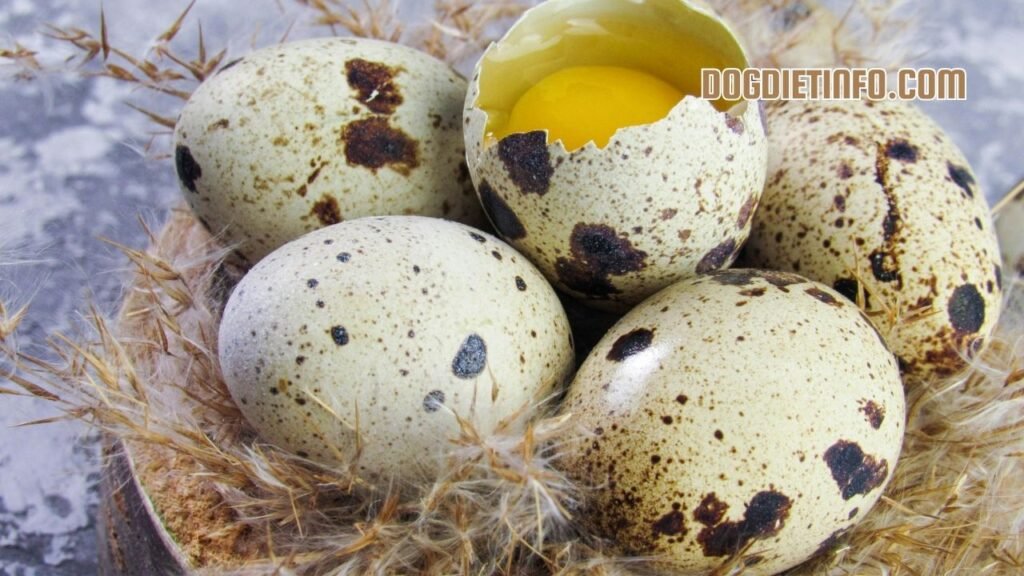Are Quail Eggs Good For Dogs? Quail eggs are generally safe and nutritious for dogs, providing protein, vitamins, and minerals.
In recent years, there has been a growing interest among pet owners in providing natural and nutritious foods to their furry companions.
As more people turn to whole, unprocessed foods for their own diets, the same approach is being applied to what they feed their pets.
One such food that has garnered attention is quail eggs. Quail eggs, small but packed with nutrients, have become popular for their potential health benefits for dogs.
But are quail eggs a good addition to a dog’s diet? This article will explore the nutritional benefits, potential risks, and best practices for feeding quail eggs to dogs.
Contents
What Are Quail Eggs?
Quail eggs are small, speckled eggs laid by quails, a type of bird found in many parts of the world. They are much smaller than chicken eggs, roughly one-third the size, but they pack a nutritional punch.
Quail eggs are rich in protein, vitamins, and minerals, making them a popular choice for those seeking to add variety and nutritional value to their diet—and potentially to their pets’ diets as well.
Nutritional Profile of Quail Eggs
- Protein: Quail eggs are an excellent source of high-quality protein, which is essential for building and repairing tissues in the body. Protein is particularly crucial for active dogs or those in their growth stages, as it supports muscle development and overall strength.
- Vitamins: They contain vitamins A, B, and D, which support eye health, energy metabolism, and bone development, respectively. Vitamin A is vital for vision and immune function, while B vitamins (such as B12 and riboflavin) are necessary for converting food into energy. Vitamin D is essential for calcium absorption and bone health.
- Minerals: Quail eggs are also rich in minerals like iron, which is crucial for red blood cell production, and phosphorus, which supports healthy bones and teeth. Iron is particularly beneficial for dogs that are prone to anemia, while phosphorus works in conjunction with calcium to build strong bones.
Benefits of Quail Eggs for Dogs
Feeding quail eggs to dogs can offer several potential health benefits, provided they are given in moderation. Here are some of the key advantages:
High-Quality Protein Source
Protein is vital for dogs as it supports muscle development, tissue repair, and overall health. [Are Quail Eggs Good For Dogs?]
Quail eggs are a highly digestible source of protein, making them an excellent addition to a dog’s diet, especially for active or growing dogs that need a protein boost.
Unlike some other protein sources, quail eggs are low in fat, making them a lean protein choice that can benefit dogs who require a controlled diet to maintain a healthy weight.
Rich in Vitamins and Minerals
Quail eggs provide essential vitamins like A, B, and D, which are crucial for various bodily functions. [Are Quail Eggs Good For Dogs?]
Vitamin A helps maintain healthy skin and eyes, vitamin B supports energy metabolism, and vitamin D is vital for bone health.
These vitamins, along with minerals like iron and phosphorus, contribute to overall canine wellness.
The combination of these nutrients can help boost a dog’s energy levels, support a healthy metabolism, and promote strong bones and teeth, particularly important for aging dogs or those with nutritional deficiencies.

Supports Skin and Coat Health
The nutrients found in quail eggs, particularly the proteins, vitamins, and essential fatty acids, can promote a shiny coat and healthy skin.
For dogs prone to skin issues, adding quail eggs to their diet might help improve their skin condition. [Are Quail Eggs Good For Dogs?]
The presence of essential fatty acids in quail eggs helps in maintaining the skin’s natural barrier, reducing dryness, itching, and flakiness.
Consistent consumption may lead to a noticeable improvement in the quality and appearance of a dog’s coat, making it shinier and healthier.
Digestive Health and Immunity
Quail eggs are not only easy to digest but can also support gut health. They contain compounds that can help strengthen a dog’s immune system, making them more resilient to infections and diseases.
The amino acids and other nutrients in quail eggs can promote a balanced gut microbiome, which is essential for a healthy digestive system.
Dogs with digestive sensitivities or those recovering from illness may benefit from the easy-to-digest properties of quail eggs, which can help soothe the digestive tract while providing essential nutrients.
Potential for Reduced Allergies
For dogs with allergies to chicken eggs, quail eggs might be a safer alternative.
Many dogs tolerate quail eggs better than chicken eggs, making them an excellent option for pet owners looking to provide a nutritious egg source without triggering allergies.
Quail eggs are less likely to cause allergic reactions due to their different protein structure. [Are Quail Eggs Good For Dogs?]
This can be particularly beneficial for dogs with food sensitivities or those on elimination diets to identify potential allergens.
Potential Risks of Feeding Quail Eggs to Dogs
While there are several benefits, there are also some potential risks associated with feeding quail eggs to dogs. It’s essential to be aware of these risks to ensure your pet’s safety.
Overfeeding Concerns
Like any treat or supplement, quail eggs should be fed in moderation. Overfeeding can lead to weight gain and obesity, especially in smaller or less active dogs.
It is important to incorporate quail eggs as part of a balanced diet rather than making them a staple. [Are Quail Eggs Good For Dogs?]
Feeding too many eggs could lead to an imbalance in a dog’s overall diet, potentially causing issues such as digestive upset, diarrhea, or other gastrointestinal problems.
Possible Allergies
Although quail eggs are less likely to cause allergies compared to chicken eggs, some dogs may still be allergic to them. [Are Quail Eggs Good For Dogs?]
Pet owners should monitor their dogs for signs of allergic reactions, such as itching, gastrointestinal upset, or changes in behavior, and consult a veterinarian if any issues arise.
Dogs can develop allergies to new foods at any time, so it’s important to introduce quail eggs gradually and watch for any adverse reactions.
Salmonella and Other Bacteria
Raw eggs, including quail eggs, carry the risk of bacterial contamination, such as Salmonella. It’s crucial to source quail eggs from a reliable supplier and handle them properly. If you are concerned about the risk of bacteria, cooking the eggs thoroughly can help mitigate this risk.
While dogs have more robust digestive systems than humans and are generally less susceptible to foodborne illnesses, it is still a consideration for puppies, older dogs, or those with weakened immune systems.
How to Feed Quail Eggs to Dogs
Introducing quail eggs to a dog’s diet should be done carefully to ensure they reap the benefits without any adverse effects. Here are some tips on how to safely feed quail eggs to your dog:
Raw vs. Cooked: Which is Better?
There is a debate among pet owners about whether quail eggs should be served raw or cooked. Raw eggs preserve more of their natural nutrients but come with a higher risk of bacterial contamination. Cooking quail eggs can reduce this risk while still providing essential nutrients.
The choice between raw and cooked often depends on your dog’s health and your comfort level with handling raw foods. If feeding raw, ensure the eggs are fresh and sourced from a reputable supplier.
For those opting for cooked eggs, boiling or lightly scrambling without added salt or oil can make them a safe and nutritious treat.
Serving Size and Frequency
The serving size of quail eggs should depend on the size and nutritional needs of your dog. [Are Quail Eggs Good For Dogs?]
For small dogs, half to one quail egg per day is typically sufficient, while larger dogs can have up to two or three. It’s essential to consider the overall diet and caloric intake to prevent overfeeding.
Pet owners should also account for any other protein sources or treats being given to avoid exceeding the recommended daily calorie intake for their dog.
Introducing Quail Eggs Gradually
When adding quail eggs to your dog’s diet for the first time, start with small amounts to see how they respond. [Are Quail Eggs Good For Dogs?]
Gradually increase the quantity while monitoring for any signs of allergies or digestive upset. This step-by-step approach will help ensure that your dog adjusts well to the new addition to their diet.
Start with small portions—perhaps a quarter or half of a quail egg—and gradually work up to the appropriate serving size over a week or two.
This method allows you to observe how well your dog tolerates the new food and reduces the likelihood of adverse reactions. [Are Quail Eggs Good For Dogs?]
Final Verdict: Are Quail Eggs Good For Dogs?
While quail eggs offer numerous health benefits for dogs, it is important to introduce them cautiously and monitor for any adverse reactions.
They can be an excellent supplement to a balanced diet when given appropriately, adding variety and valuable nutrients to your dog’s meals.
Always consult your veterinarian before introducing new foods to your pet’s diet, particularly if your dog has any pre-existing health conditions.
When used wisely, quail eggs can be a delightful and healthy addition to a dog’s diet, contributing to their overall well-being. [Are Quail Eggs Good For Dogs?]
See Also: Is Rachael Ray Nutrish Good For Dogs?
FAQs
Can quail eggs cause allergies in dogs?
Yes, while less common, some dogs may be allergic to quail eggs. Always monitor for signs of an allergic reaction, such as itching, vomiting, or diarrhea. [Are Quail Eggs Good For Dogs?]
How often can I feed quail eggs to my dog?
Quail eggs can be fed a few times a week as a supplement to a balanced diet, depending on your dog’s size and nutritional needs. It’s important to moderate the quantity to avoid any nutritional imbalances.
Are raw quail eggs safe for dogs?
Raw quail eggs can be safe if sourced from a reputable supplier, but they do carry a risk of bacterial contamination. Cooking the eggs can reduce this risk, especially for puppies, senior dogs, or those with compromised immune systems.
Can puppies eat quail eggs?
Yes, puppies can eat quail eggs, but it’s crucial to introduce them gradually and in moderation to avoid digestive issues. Ensure that the eggs are cooked to reduce the risk of bacterial infections.
What are the signs of a dog being allergic to quail eggs?
Signs of allergies can include itching, swelling, gastrointestinal upset, and changes in behavior. If these occur, consult a veterinarian immediately to determine the cause and appropriate treatment.
Conclusion: Are Quail Eggs Good For Dogs?
Quail eggs can be a nutritious and beneficial addition to a dog’s diet, providing high-quality protein, essential vitamins, and minerals that support overall health.
They can help improve skin and coat condition, support immune health, and provide a good alternative for dogs with chicken egg allergies.
However, they should be fed in moderation and sourced carefully to avoid potential risks like allergies or bacterial contamination. [Are Quail Eggs Good For Dogs?]

Derrick Wilcox is a certified canine behaviorist with over 12 years of experience at Happy Paws Animal Clinic and Pawsitive Training Center, helping pet owners ensure safer, healthier, and happier lives for their dogs.



